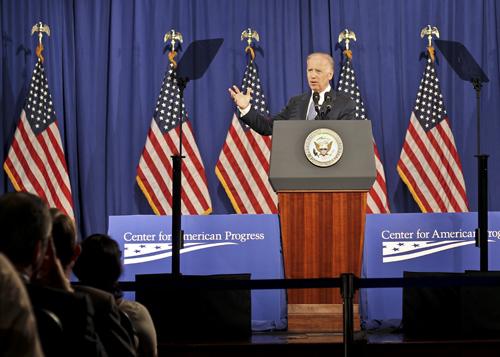
Vice President Joe Biden laid out how the United States would reach out a hand to burgeoning Asian nations – and even ones in squalor, like North Korea – in a speech at Jack Morton Auditorium on Thursday.
A week before traveling to India and Singapore, Biden said the Obama administration hopes to improve food security, water safety and intellectual property protections in the region by the end of the year.
The region has been somewhat out-of-focus for the U.S.’s foreign policy strategy in recent years, as the the country focused on creating stability in the Middle East. Biden said the end of the Iraq and Afghanistan wars opened up possibilities for the U.S. to help Asia develop fewer border restrictions and more cooperation.
“In the Asia Pacific, we saw a region of remarkable promise, but also of genuine uncertainty and political risk,” he said at the speech hosted by the Center for American Progress. “Many nations have experienced rapid economic transformation that has fundamentally created a new dynamic of rising ambitions and rising tensions.”
With a vast middle class, Biden said the region could help elevate the global economy even more than it already does, given more resources and attention from developed nations like the U.S. He said the U.S. will work with its allies in the area to strengthen relationships with countries like India, China and even North Korea.
Biden said the U.S. is working with countries like South Korea and Japan to move forward in negotiations with North Korea, but said the Obama administration is only “prepared to engage in genuine negotiations.”
“North Korea has a clear choice. It can choose a better path for its people, or continue down the road they’re on,” Biden said. “Make no mistake about it, though. We are open to engaging with any nation prepared to live up to its international obligations.”
Biden stressed that compromises the U.S. has made with China could serve as examples for agreements with countries like India, a rising global power that the Obama administration considers its next global partner.
While America’s relations with China has been tense in recent years, Biden said that China should liberalize their exchange rates and turn to a regulated, market-based financial system, which would help improve their economic relations. “We do not view our relationship and future relationships with China in terms of conflict or inevitable conflict. We view it in in terms of competition and compromise,” Biden said.
India’s economy and security would also improve if it could strike a climate change agreement like the U.S. and China did last week, Biden said. Trade with India has increased five-fold in recent years, and Biden said that could occur again if both countries make the right choices moving forward.
He added that the U.S. was not leaving Europe or the Middle East to focus on a new part of the world.
“There is no reason why we cannot bring greater focus to the Asia Pacific and keep our eye on the ball in the Middle East,” he said. “Folks, that’s what big powers do. To use the vernacular, we can walk and chew gum at the same time.”




